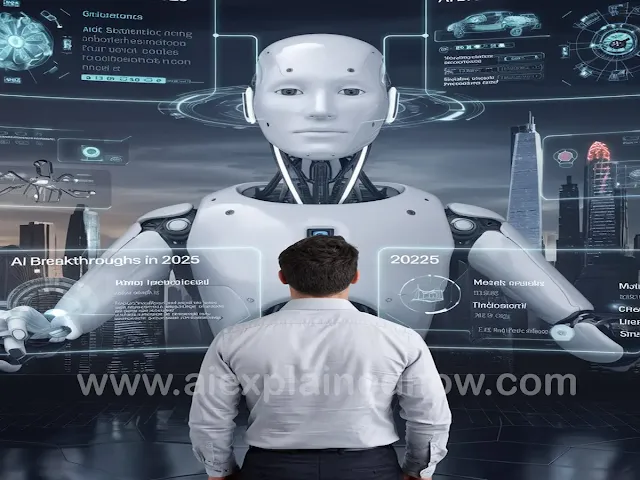The Latest AI Breakthroughs You Need to Know in 2025
 |
| 2025: Unveiling the Year’s Groundbreaking AI Innovations |
Artificial Intelligence (AI) continues to evolve at an unprecedented pace, reshaping industries and redefining what’s possible across a range of fields. As we step into 2025, AI is reaching new heights, presenting groundbreaking innovations that promise to transform how we work, communicate, and interact with technology. Below, we explore the latest AI breakthroughs that you need to know about this year.
Top AI Innovations of 2025 You Can’t Afford to Miss
1. Hyper-Personalized AI Assistants
AI assistants in 2025 are no longer one-size-fits-all. This year marks the emergence of hyper-personalized AI assistants that adapt to individual user preferences, learning from nuanced behaviors to deliver tailored support. Unlike traditional AI assistants that rely on static programming, these systems use advanced reinforcement learning and natural language processing to provide context-aware assistance.
For instance, hyper-personalized AI assistants can now:- Predict user needs based on historical patterns.
- Offer real-time emotional support by analyzing tone and language.
- Manage multi-layered tasks like project planning, reminders, and social interactions seamlessly.
This leap forward is particularly evident in healthcare, where AI-powered systems assist patients with personalized therapy plans, or in education, where tailored learning paths are redefining traditional classrooms.
2. Breakthroughs in AI-Powered Creativity
Generative AI tools have reached astonishing levels of sophistication. While platforms like GPT-based systems and image generators have been impressive, 2025 introduces AI that can compose entire movies, design complex architectural blueprints, and even collaborate with human creators in real-time.
Key milestones include:- AI music composers are capable of producing symphonies indistinguishable from those crafted by human artists.
- Tools like Neural Canvas 2.0 allow artists to sketch concepts that AI then transforms into hyper-realistic art.
- AI storytelling platforms that write engaging scripts or books while maintaining the author's voice and vision.
3. Autonomous AI in Everyday Life
Autonomous systems have made their way from controlled environments into our daily routines. From self-driving cars becoming a practical reality in urban areas to autonomous drones revolutionizing logistics and disaster relief, these systems are now embedded in society.
In 2025, autonomous AI will extend its influence in areas like:- Transportation: Fully operational autonomous ride-sharing networks are being tested in several major cities, reducing traffic accidents and improving efficiency.
- Agriculture: AI-driven robots are automating crop management, optimizing irrigation, and even predicting weather patterns to mitigate risks.
- Smart Homes: AI-integrated smart homes now include robots that perform household chores while adapting to family routines and preferences.
4. AI-Driven Drug Discovery and Healthcare
One of the most exciting advancements this year lies in AI's impact on healthcare. AI-powered drug discovery platforms are accelerating the development of treatments for complex diseases by analyzing vast datasets of molecular and genetic information.
Notable breakthroughs include:- The identification of promising new compounds for treating rare diseases in a fraction of the traditional timeline.
- AI diagnostic tools are capable of detecting illnesses like cancer, Alzheimer’s, and cardiovascular conditions with unparalleled accuracy.
- Virtual clinical trials powered by AI, reduce costs and make life-saving treatments accessible sooner.
5. Evolution of Ethical and Transparent AI
As AI becomes more ingrained in society, concerns about ethics, bias, and transparency have grown. In 2025, significant progress has been made toward addressing these issues.
- Regulatory Frameworks: Governments worldwide are adopting stricter AI governance policies, ensuring that AI systems remain unbiased, fair, and transparent.
- Explainable AI (XAI): XAI frameworks are empowering users to understand how AI models make decisions, increasing trust and accountability.
- Inclusive Data Practices: Developers are working to eliminate biases by creating datasets that better represent diverse populations and perspectives.
6. AI in Climate and Environmental Solutions
AI is emerging as a pivotal tool in combating climate change and promoting sustainability. In 2025, its applications extend to:
- Predicting and mitigating the impact of natural disasters through advanced weather modeling.
- Optimizing renewable energy grids, ensuring maximum efficiency and reliability.
- Developing AI-driven recycling systems capable of sorting and processing waste more effectively than human-operated systems.
7. Quantum AI: The Next Frontier
Quantum computing and AI are converging, unlocking possibilities previously deemed impossible. Quantum AI combines the computational power of quantum systems with machine learning algorithms to solve highly complex problems.
Applications making waves in 2025 include:
- Optimizing global supply chains in real-time to reduce costs and environmental impact.
- Enhancing cybersecurity by rapidly detecting and countering threats.
- Solving problems in astrophysics and molecular biology that were previously intractable.
Looking Ahead
The AI breakthroughs of 2025 mark a transformative era where technology is becoming increasingly intelligent, creative, and indispensable. While the advancements are thrilling, they come with challenges—ethical dilemmas, regulatory hurdles, and questions about societal impacts.
As we embrace these innovations, it’s crucial to prioritize human-centric AI development, ensuring these technologies enhance our lives while addressing global challenges. The future of AI is undeniably bright, and staying informed is key to navigating this rapidly evolving landscape.
What excites you most about AI in 2025? Share your thoughts below!

